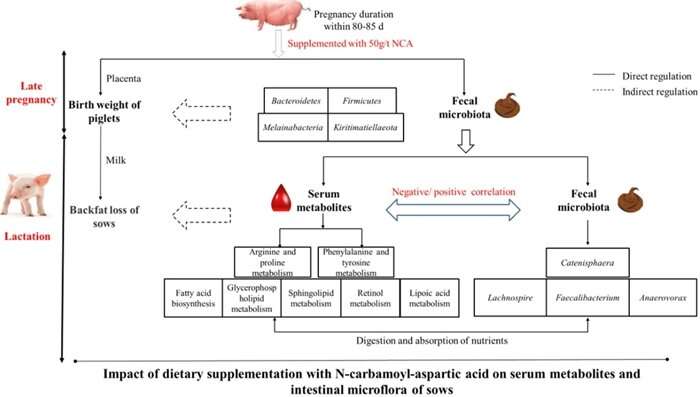Impact of Dietary Supplementation with N-carbamoyl-aspartic Acid on Serum Metabolites and Intestinal Microflora of Sows. Credit: Gao Lumin
Maternal nutrition status plays a vital role in the growth and development of the major fetal organ systems, and fetal growth is dramatically increased during late gestation while nutrient requirements of sows increase significantly in late gestation due to the rapid growth of the fetal-placental unit. As the most important factors of maternal nutrition, glucose, fatty acids, and amino acids are of great significance to the health and growth of the fetus.
In addition, the fastest growing stage of fetal small intestine is during late pregnancy, and an impaired intestine in fetus can lead to a higher diarrhea rate and lower growth performance after birth. Therefore, promoting piglet health by regulating the nutrition of sows during late gestation and lactation is crucial for improving productive performance in the pig industry.
Wu Xin's research team from the Institute of Subtropical Agriculture of the Chinese Academy of Sciences has systematically studied the feeding effects of dietary nucleotides in sows and discussed its mechanism of placental transport, nutrient metabolism, intestinal development, and other aspects.
The researchers found that maternal nucleotide, pyrimidine nucleoside and uridine supplementation could regulate placental nutrient transport, largely in response to an alteration of mTORC1-PPAR signaling. Maternal nucleotide, pyrimidine nucleoside or uridine supplementation also regulates nucleotides, glucose, amino acids and fatty acids metabolism of neonatal piglets, thereby improving the reproductive performance of sow to a certain extent.
Moreover, maternal nucleotide and uridine supplementation also contributed to reducing incidence of diarrhea by regulating cytokine secretion and intestinal mucosal barrier function in neonatal and suckling piglets, thereby improving weaning weight of the litter of suckling piglets.
Furthermore, as a critical precursor for de novo biosynthesis of pyrimidine nucleotides, N-Carbamoyl-aspartic acid supplementation regulated intestinal microbial composition of sows and serum differential metabolites related to arginine, proline, phenylalanine, tyrosine, and fatty acids metabolism that may contribute to regulating the backfat loss of sows, and the birth weight and diarrhea rate of piglets.
These findings provide a theoretical basis and technical support for the rational application of nucleotide in sow breeding.
These research results have been published in Animal Nutrition, Journal of the Science of Food and Agriculture and British Journal of Nutrition.
More information: Lu-min Gao et al, Maternal pyrimidine nucleoside supplementation regulates fatty acid, amino acid and glucose metabolism of neonatal piglets, Animal Nutrition (2022). DOI: 10.1016/j.aninu.2022.07.011
Lumin Gao et al, Yeast-based nucleotide supplementation in mother sows modifies the intestinal barrier function and immune response of neonatal pigs, Animal Nutrition (2021). DOI: 10.1016/j.aninu.2020.06.009
Lu‐min Gao et al, Impact of dietary supplementation with N ‐carbamoyl‐aspartic acid on serum metabolites and intestinal microflora of sows, Journal of the Science of Food and Agriculture (2022). DOI: 10.1002/jsfa.12186
Lu‐Min Gao et al, Maternal yeast‐based nucleotide supplementation decreased stillbirth by regulating nutrient metabolism, Journal of the Science of Food and Agriculture (2020). DOI: 10.1002/jsfa.11037
Xin Wu et al, Maternal dietary uridine supplementation reduces diarrhea incidence in piglets by regulating the intestinal mucosal barrier and cytokine profiles, Journal of the Science of Food and Agriculture (2020). DOI: 10.1002/jsfa.10410
Lu-min Gao et al, Maternal supplementation with uridine influences fatty acid and amino acid constituents of offspring in a sow–piglet model, British Journal of Nutrition (2020). DOI: 10.1017/S0007114520003165
Journal information: Journal of the Science of Food and Agriculture , British Journal of Nutrition
Provided by Chinese Academy of Sciences























